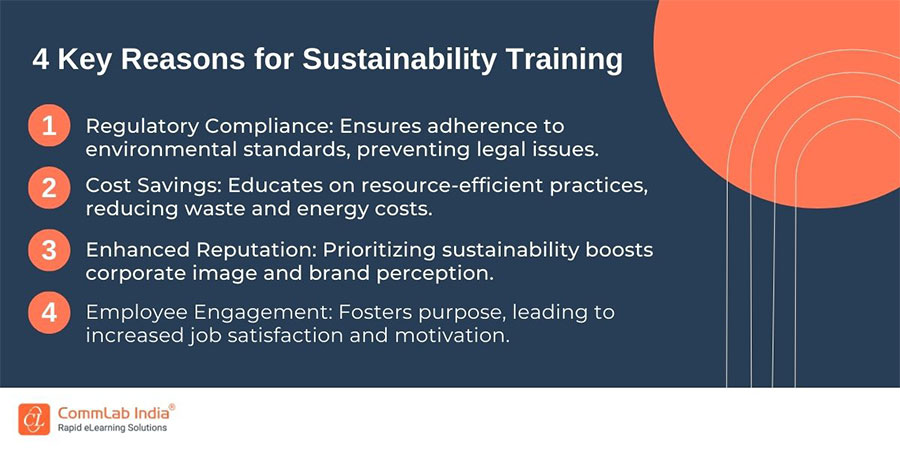Eco-Win: Sustainability Training for Business Brilliance
Read on to explore how sustainability training transforms businesses, aligning them with eco-friendly practices.

In today's business world, being sustainable is more than just a trendy term; it's a must-do. Companies now realize the importance of being eco-friendly and socially responsible. To make this happen, they're integrating sustainability into how they operate. One super useful tool in this green journey is sustainability training. In this blog, we're going to explore how learning about sustainability can be a game-changer for businesses, helping them reach their goals in a way that's good for the planet and the community. Let's dive into how sustainability training can transform businesses for the better.
What is Sustainability Training?
Sustainability training is about training practices that balance economic, social, and environmental concerns. It equips individuals and organizations with the knowledge and skills to make eco-friendly and socially responsible choices. This training ensures that businesses thrive while minimizing negative impacts on the planet and society.
The Evolution of Sustainability in Business
To understand the significance of sustainability training, it's crucial to trace the evolution of sustainability in the business world. The corporate landscape has undergone profound transformation in the past few decades. It is amidst this period that sustainability emerged as a fundamental pillar of business strategy.
From a focus on profit maximization to a broader recognition of the triple bottom line—people, planet, and profit—organizations are redefining success by incorporating sustainable practices.
Sustainability is no longer just a trendy term; it's a must for businesses in today's complex world. Sustainability training plays a key role in this shift, helping companies adopt eco-friendly practices.
The Business Case for Sustainability Training
Why invest in sustainability training? The business case is compelling.

Sustainability training equips employees with the knowledge and skills to navigate the complexities of sustainable business practices. It fosters a culture of responsibility, innovation, and resilience. By aligning employees with the organization's sustainability goals, businesses can enhance their reputation, mitigate risks, and capitalize on emerging market opportunities. Sustainability training becomes the linchpin connecting corporate values with tangible, positive outcomes.
Key Components of Effective Sustainability Training
For sustainability training to make a lasting impact, it must encompass key components that resonate with employees at all levels. These components include:

1. Foundations of Sustainability: Sustainability training delves deep into the core principles, emphasizing environmental stewardship, social responsibility, and economic viability. Employees gain profound insights into the interconnectedness of these pillars, fostering a holistic understanding of sustainable practices.
2. Regulatory Compliance: An integral aspect of sustainability training involves a thorough exploration of local and international regulations. This comprehensive understanding ensures that businesses not only meet legal requirements but also adhere to ethical standards in their pursuit of sustainability.
3. Green Practices: Practical guidance forms a significant part of sustainability training, offering employees actionable insights on integrating eco-friendly practices into their daily workflows. This includes everything from resource conservation techniques to effective strategies for waste reduction.
4. Stakeholder Engagement: Sustainability is a collective effort that extends beyond the boundaries of an organization. In-depth training equips employees with the skills to engage with diverse stakeholders such as communities, suppliers, and customers. This fosters meaningful collaboration and helps build positive relationships that contribute to the broader sustainability goals.
5. Innovation for Sustainability: Sustainability is an evolving field, and training encourages a mindset of continuous improvement and innovation. Employees learn to identify opportunities for sustainable solutions, fostering a culture of proactivity in driving positive environmental and social impact.
→ Download Now: eLearning for Sustainability Training [Case Study]
Aligning Sustainability Training with Business Goals
The success of sustainability training lies in its seamless integration with overarching business objectives. By aligning training programs with specific sustainability targets, businesses can:
1. Enhance Employee Engagement: Sustainability training fosters a sense of purpose among employees, elucidating the link between individual actions and overarching business goals. This comprehensive understanding ignites enthusiasm and active participation in sustainability initiatives.
2. Drive Operational Efficiency: Beyond mere compliance, sustainability training delves into operational intricacies, identifying areas for improvement. By implementing sustainable practices, businesses not only contribute to environmental well-being but also achieve resource savings and operational cost reductions.
3. Strengthen Brand Reputation: Sustainability-educated employees serve as influential brand advocates. As they embody the principles of social and environmental responsibility, they contribute to enhancing the brand's reputation. This positive image attracts environmentally conscious customers and partners, further solidifying the brand's market position.
4. Meet ESG Criteria: Sustainability training positions businesses to meet Environmental, Social, and Governance (ESG) criteria strategically. This isn't just about ticking compliance boxes; it's a proactive move that transforms adherence into a competitive advantage. Meeting ESG criteria becomes a compelling narrative for attracting investors and customers who prioritize sustainable practices.
Want to take your sustainability training a notch-higher? Here's a video that’ll help:
Measuring the Impact of Sustainability Training
Quantifying the impact of sustainability training is vital for demonstrating ROI and refining future initiatives. Key performance indicators (KPIs) may include:
1. Employee Adoption Rates: Tracking the percentage of employees participating in sustainability training programs.
2. Operational Metrics: Monitoring resource usage, waste reduction, and energy efficiency improvements resulting from sustainable practices.
3. Stakeholder Surveys: Gathering feedback from stakeholders to assess the perceived commitment to sustainability and ethical business practices.
4. Financial Performance: Analyzing the financial outcomes of sustainability initiatives, including cost savings and revenue generated from sustainable products or services.
Wrapping Up
Sustainability training isn't merely a checkbox for corporate responsibility; it's a dynamic catalyst for achieving long-term business success. By investing in the knowledge and skills necessary for sustainable practices, organizations position themselves as leaders in a world where environmental and social considerations are paramount. As businesses embark on this transformative journey, sustainability training emerges as a strategic imperative, driving positive change, fostering innovation, and ultimately propelling the realization of business goals in a sustainable future.
Want to explore how eLearning can seamlessly integrate sustainability training into your business strategy? Download our case study: "eLearning for Sustainability Training" now! Uncover the transformative impact on employee engagement, operational efficiency, and overall business success.
Download Now!





